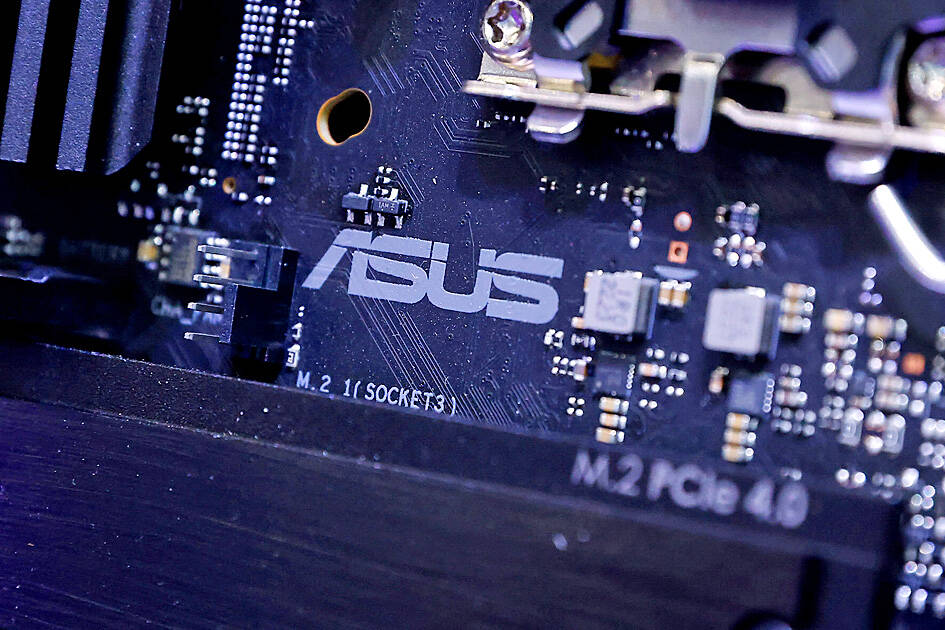PC vendor Asustek Computer Inc (華碩) is restructuring after posting its first quarterly losses in four years last quarter, it said yesterday.
The company hopes to expand its commercial PC market share to 10 percent from 5 percent, Asustek cochief executive officer Samson Hu (胡書賓) said at an online media briefing.
Commercial PC business is the second-biggest business group of the company, with a headcount of 540, Asustek said.

Photo: REUTERS
Asustek hopes to safeguard its leading position in the gaming PC market, Hu said.
The restructuring would not lead to massive layoffs, Hu said, dismissing media reports that the company was planning to cut up to 800 jobs.
Only a very small number of positions could be axed, as the company has about 600 vacancies that need to be filled, he added.
“The company’s structural adjustments do not aim to cut jobs, but to optimize the company’s operations and improve its agility, allowing the company to quickly respond to rapid market changes,” Hu said.
The global PC industry has faced challenges over the past few quarters in terms of macroeconomic conditions, supply chain issues and consumer demand, Hu said.
Asustek reported net losses of NT$3.82 billion (US$124.33 million) last quarter, which the company blamed on high channel inventories and disappointing PC sales.
Under the company’s restructuring plans, Asustek has divided its businesses into three categories: the consumer product business group, commercial product business group and mobile product business group. Gaming PCs would be included in the consumer product business group.
Asustek gaming PC business head Chang Yang-kuang. (張仰光) is to oversee the company’s consumer product business group, while Chang Kai-shun (張凱舜) would take charge of the commercial product and mobile business groups.
The adjustments are to take effect on July 1.

The US dollar was trading at NT$29.7 at 10am today on the Taipei Foreign Exchange, as the New Taiwan dollar gained NT$1.364 from the previous close last week. The NT dollar continued to rise today, after surging 3.07 percent on Friday. After opening at NT$30.91, the NT dollar gained more than NT$1 in just 15 minutes, briefly passing the NT$30 mark. Before the US Department of the Treasury's semi-annual currency report came out, expectations that the NT dollar would keep rising were already building. The NT dollar on Friday closed at NT$31.064, up by NT$0.953 — a 3.07 percent single-day gain. Today,

‘SHORT TERM’: The local currency would likely remain strong in the near term, driven by anticipated US trade pressure, capital inflows and expectations of a US Fed rate cut The US dollar is expected to fall below NT$30 in the near term, as traders anticipate increased pressure from Washington for Taiwan to allow the New Taiwan dollar to appreciate, Cathay United Bank (國泰世華銀行) chief economist Lin Chi-chao (林啟超) said. Following a sharp drop in the greenback against the NT dollar on Friday, Lin told the Central News Agency that the local currency is likely to remain strong in the short term, driven in part by market psychology surrounding anticipated US policy pressure. On Friday, the US dollar fell NT$0.953, or 3.07 percent, closing at NT$31.064 — its lowest level since Jan.

Hong Kong authorities ramped up sales of the local dollar as the greenback’s slide threatened the foreign-exchange peg. The Hong Kong Monetary Authority (HKMA) sold a record HK$60.5 billion (US$7.8 billion) of the city’s currency, according to an alert sent on its Bloomberg page yesterday in Asia, after it tested the upper end of its trading band. That added to the HK$56.1 billion of sales versus the greenback since Friday. The rapid intervention signals efforts from the city’s authorities to limit the local currency’s moves within its HK$7.75 to HK$7.85 per US dollar trading band. Heavy sales of the local dollar by

The Financial Supervisory Commission (FSC) yesterday met with some of the nation’s largest insurance companies as a skyrocketing New Taiwan dollar piles pressure on their hundreds of billions of dollars in US bond investments. The commission has asked some life insurance firms, among the biggest Asian holders of US debt, to discuss how the rapidly strengthening NT dollar has impacted their operations, people familiar with the matter said. The meeting took place as the NT dollar jumped as much as 5 percent yesterday, its biggest intraday gain in more than three decades. The local currency surged as exporters rushed to